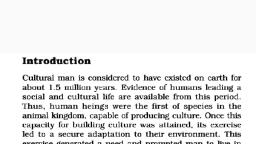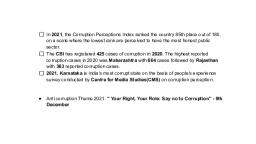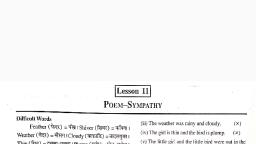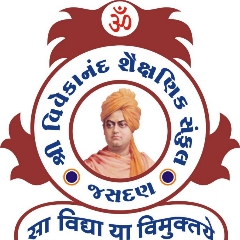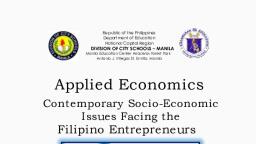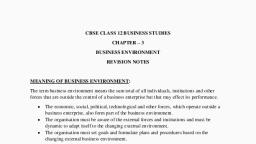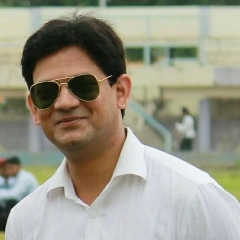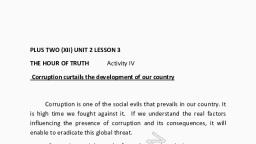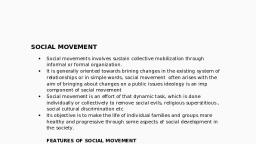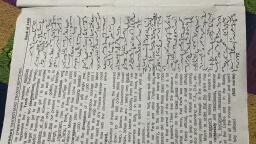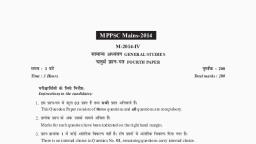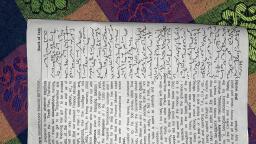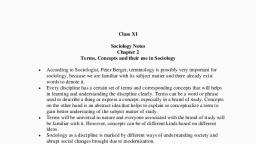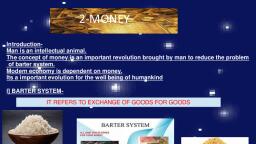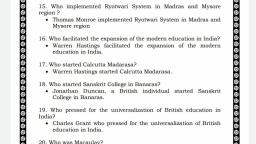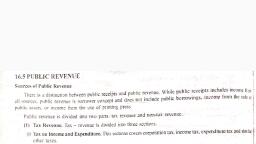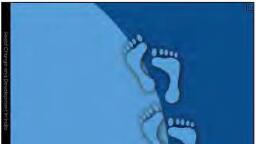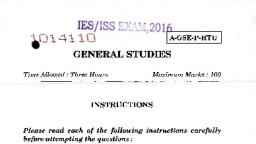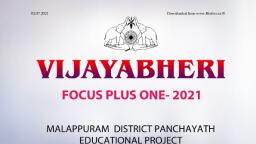Page 1 :
6. CORRUPTION, , Corruption is both Historical and Universal, , i Corruption as a phenomenon is both universal and historical. It is a fact of history that there, voli NO society in the past in which corruption was totally absent. At the same time, corruption is, mes a u One way or another in all the existing societies of the world. Its content and character, its, forms and j,, , ntensity, of course, may differ from society to society,, , Corruption as a Social Evil, , . Corruption is one of the social evils found in all the societies of the world. In some societies,, itis more rampant than in some others, Unfortunately, India is regarded as one of the countries where, corruption has become very much widespread during the recent years. Corruption is one of the, factors that has contributed to the degradation of the Indian politics. Corruption in India has become, deep-rooted and its growth is unchecked and unhindered. All those leaders who declared war against, corruption have either shamelessly succumbed to corruption or miserably lost the battle. Tall claims, , made by political leaders to fight out corruption have proved to be shallow., , “Power corrupts and absolute Power corrupts absolutely.” That is what the events at the, national political scene seem to Suggest, at least during the last couple of years. Practise of corruption, at lower levels by some clerks, peons and attenders for some petty amount, is understandable and, tolerable. They may practice it due to tough financial conditions, excessive demands from family,, friends or society, health hazards, or some other kinds of pressures. What is more disturbing and, dangerous is the corruption at higher levels. Corruption in various forms has become the mainstay of, our national polity in the recent past. It is needless to say that the evil of corruption meaning bribery, and graft, is not conducive to social stability and equilibrium. It invariably involves negation or, betrayal of normative values of society, which are essential for the smooth functioning of society., , Definition of the Concept of Corruption, , The meaning of the concept of corruption can be made clearer by means of some definitions., , 1. In simple words, corruption refers to “an act of bribery.” It is abuse of political Power or, public office for personal or private gain brushing aside all formal rule., , 2° The dictionary defines corruption as “an inducement to wrong by bribery or other unlawful, means : a departure from what is pure and correct.”
Page 2 :
3., , 4., , 5., , According to D.H. Bailey, corruption can be understood as the eee of authority ‘a, ty, result of consideration of personal gain which need not be monetary., , Andriski considers it as. “the use of public power for private advantage in ways Which, transgress some formal rule or law.”, , Bhargava says that an “act of commission or omission bya public servant for Securing, pecuniary or other material advantage or indirectly for himself, his family or friends is, corruption.”, , Main Characteristics of Corruption, , AYN, , 6., , The above cited definitions point out the following characteristics of corruption., Corruption, as it is understood today refers to an irregular, illegal and immoral practice, associated with our public life., , An act of corruption involves dereliction of duty, moral and legal lapses., Persons party to corruption tend to neglect their prescribed duty deliberately., , Individuals who are charged of corruption are those who deviate from their fixed official duty, in order to obtain some economic gains or to provide some physical comfort or convenience, to his family members., , Corruption involves the practice of receiving bribe not only for getting wrong things done,, but also getting right things done at the right time., , Corruption involves the abuse of power associated with a public office or public life., , Corruption in Public Life and among Public Servants, , Corruption has become a widespread practice today. It has percolated through almost all, , the fields of our social life. No part of our public life is spared from it. A large number of public, servants are guilty of either practising or supporting corruption. The term “corruption” has a very, , wide meaning, and from the legal point of view, the following behaviour patterns can be dubbed as, corrupt practices, according to Malhotra., , qa), , Q), , (3), , 4), , (S), , ©, , Receiving some reward on the part of a public servant, for the work done by him in his official, , capacity. Example: A doctor in a Government hospital receiving monetary reward from @, patient for having treated him., , Obtaining any object or pecuniary advantage illegally. Example: Police officers receiving, “mamul” at the hands of small vendors found in footpaths of busy areas of a city., , Misappropriation of public property. Example: Government officers using their departmental, vehicles for their personal tours, family purposes., , Possessing property or financial resources disproportionate to one’s declared sources of income., , Example: Clerks and officers in R.T.O. [Regional Transport Office] owning film theatres,, hotels, couple of acres of high yielding agricultural lands, etc:, , Abuse or misuse of official position. Example: Police officers, , : ‘ misusing their position to get, free supply of fruits, vegetables and daily required things from the petty cama,, , Disregard of rules purposefully to help citizens in avoiding dues / tax / duty due to be paid to, the government. Example: Income tax, sales tax, commercial tax, and other tax officefs, favouring some people either in reducing dues or in waiving of the same after obtaining some, financial benefits from them. : ‘ ,, , 1
Page 3 :
|, a not registering a case to protect a criminal., , , , i r, Refusal to do duty on some plea which may benefit the other party. Example: police office:, , Accepting gifts [such as car, gold chain, fridge, colour T.V.., etc-] by “persons of posiow, from persons with whom they have official dealings. Example: Building contractors ed, gifts to the corporation commissioner, businessmen giving gifts to commercial tax Zerg, with the expectation of getting some favours which would cause loss to the government. ., 0) Borrowing money for purchasing a costly thing from a person with whom one has official, dealings. Example: Income tax officer borrowing money from a businessman to purchase a, house, the act of which compels him to do some official favours to the lender of moneyCorruption is so rampant that it is found in all the ministries and departments of the central, od the state governments. In some ministries in the union government such as defence, petroleum,, wer and communication, chances for “making money” through corrupt practices, are more. In the, sme way, certain departments such as police, transport, income tax, sales tax, commercial tax,, revenue department, etc., provide lot of opportunities for the public servants working in them to, make money in an illegal way., Corruption is so widespread today that people have come to accept it as a commonly, approved practice. No wonder, if it becomes institutionalised in the days to come., , @, , Causes of Corruption, , Cortuption is like blood cancer. It has taken deep roots in the country. It has percolated, through almost all fields. Corruption in Indian public life is “all pervasive” and that businessmen,, , | bureaucrats, contractors, industrialists, entrepreneurs, journalists, vice-chancellors, teachers, doctors,, | nurses andthe politicians all come under suspicion. As the time moves more and more, people are, , , , being swept by the move of corruption., , Corruption is a complex phenomenon and various factors and forces have conspired to, cause it and spread it everywhere. The causes responsible for corruption as enlisted by C.B. Mamoria, [Pages : 844 - 847], may be discussed here., , 1. Economic Insecurity : This is regarded as the most important cause of corruption, The, Poor people become corrupt in the hope of becoming rich. The rich indulge in it for fear of losing, what they have. The rich have a craving for luxurious goods and imported commodities, such as dresses, telephone receivers, golden ornaments, cosmetics, transistors, air conditioners, T.V.s, wrist, Watches, etc, This encourages smuggling on a massive scale., , 2. High Rate of Income Tax : Since tax rates are comparatively high in India even the, honest People are often tempted to escape from it by making false returns of their property and, "ome. Many of the officers in the Income Tax Department are also equally corrupt and they thrive, ™ bribery, Income tax officers, policemen, sales tax officers, excise inspectors and others started, Tinting Money not only from the black marketeers and tax evaders, but also from innocent people, , 8ave bribes in order to avoid suffering and humiliation at the hands of these officials, P, , ia 3, Meagre Salary being Paid to the Government Servants ; Employees in some of the, , eucmment departments are paid comparatively very less salary. This situation is said to be the, , es Se of corruption in administration. Clerks in the court, peons and ,attenders in all government, , "ti nts, police constables and such other employees draw poor salary, They expect tips and, “even for doing their regular or routine duties. It has been estimated that 60% to 10% ’ i., , ® are corrupt in one. form or the other. (C.B: Mamoria - Page: 845} wee
Page 4 :
—_ —_ seamen a, , 4, Emergence of New Sources of Wealth and Power : The modem political economy, |, set up provides a chance for the politicians in power to make money through illegal means,, Lincoln Steffens has said, “the politicians took bribes because businessmen Save them ang, businessmen gave them because they had to.” This unholy understanding between the businessme,, and the politicians always encourage corruption., , 5. The System of Democracy : The present style of functioning of democracy in India, alg,, contributes to corruption. All parties, especially the ruling party spends crores of Tupees on each, election. This money comes from the big businessmen, industrialists and such other rich men who, have their own vested interests in financing the elections. They supply money to the party elections, in the form of “black money.” This in turn, gives them licence a ‘moral’ justification for accumulating, “number - two” money [unaccounted money] in different forms., , 6. The Very Presence of Black Money : Existence of large amounts of unaccounted black, money is one of the main sources of corruption. “This money is obtained by various ways, namely, tax evasion, smuggling, speculation, in immovable property and shares and stocks, receiving fees, and remuneration partly or wholly in cash without showing them in the accounts, trading in licences, and permits, ......., etc.” (C.B. Mamoria - Page : 847], , 7. Social and Economic Modernisation : \t is said that modernisation breeds corruption, in industrial society, which “offers prizes for doing evil; money, position, power”, besides bringing, about attitudinal changes in the system. New loyalties and new identifications emerge among, individuals and groups. This contributes to an increase in the incidence of corruption. As Huntington, has said, “Corruption in a modernising society is in part not so much the result of deviance of, behaviour of norms from the established patterns of behaviour.” More than any other thing “the, get-rich quick” motivation inspires a large number of people both at the top and bottom of the, society to Lecome corrupt., , All the factors mentioned above have generated a favourable atmosphere for corruption., , Prevention of Corruption, Legislative Measures to Contain Corruption, , Corruption which has become widespread in the Indian society, has to be contained in, some way or the other. Legislative measures are very much necessary for this., , 1. Prevention of Corruption Act, 1947, , Certain sections of the IPC could be used for punishing those who are guilty of taking bribe., The Central Government introduced in 1947 “The Prevention of Corruption Act” for the more, effective prevention of bribery and corruption. The Act, of course, has been a miserable failure in, reaching its target. We know that corruption has increased out of all proportions., , 2. Prevention of Corruption Act, 1988, , In order to bring all relevant legal provisions relating to the practice of corruption, the, Central Government introduced the Prevention of Corruption Act, 1988. The Act consolidated the, provisions of the Prevention of Corruption Act, 1947, some sections of the Indian Penal Code, th, , Criminal Procedure Code, and the Criminal Law Act, 1952., This [1 988! Act enlerged the scope of the term “public servant.” The Act is now appics¥, the employee > the Central and the Uni ee * . ised banks, all proy nion Territories. The employees of nationali
Page 5 :
,, , qne Santhanam Committee and Its Recommendations, Corruption which has gone deep into our social life cannot be removed very easily. In fact, , ican only be reduced or minimised, and can hardly be stopped altogether. No nation has become, gccessful so far. Even for minimising this problem, both preventive and punitive measures will, pave to be taken. Thus, the Central Government appointed in 1962, a Committee on “Prevention of, omuption” under the Chairmanship of K. Santhanam, The Committee gave its report in 1964 in, which it recommended various steps to be taken to contain corruption. The Committee observes,, “corruption cannot be eliminated or even satisfactorily reduced unless preventive measures are, planned and implemented in a sustained and effective manner. Preventive action must include, administrative, legal, social, economic and educative measures”. {as quoted by C.B. Mamoria Page : 865}., , The Committee recommended the following measures :, , 1. A thorough study of the extent possible, scope and modes of corruption, should be undertaken, regarding each department, undertaking or ministry. The study must also suggest preventive, remedial measures for the same., , 2, Administrative delays should be reduced to the minimum to avoid corrupt practices. For this, purpose , (a) _ existing procedures and practices should be reviewed to avoid delays;, (b) time-limits should be prescribed for dealing with receipts and should be strictly, enforced; and, , 2: Attempts should be made to educate citizens with regard to their rights, responsibilities and, the procedures of the government., , 4 Improvement must be made to increase the salary of the employees besides making necessary, provisions. for housing, medical facilities for the government employees, etc,, , 5. Informal codes of conduct for different categories of employees particularly belonging to the, departments dealing with economic affairs must be evolved insisting on them not to avail, ihemselves of entertainment and other facilities provided to them by those with whom they, have official dealings. :, , 6. Officials should not have any dealings with a person claiming to act on behalf of an industrial, house unless he is properly authorised to do so., , 7. Companies and businessmen should be obliged to keep detailed accounts of expenditure., , Officers for the administrative posts should be selected with great care, Only. those whose, integrity is tested to the fullest satisfaction must be appointed for the key posts,, , 9. There should be a complete ban on government servants accepting private commercial oe, industrial employment for two years after retirement.

